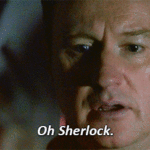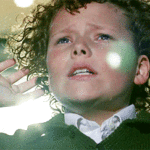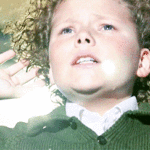“I’m not a child anymore, Mycroft.”
This just broke my heart. Sherlock always saw himself as a child in the eyes of his brother because he thought Mycroft saw him as petulant and slow. But the truth was that Mycroft saw him as a child because he never stopped protecting him. He never stopped worrying about him, and he never stopped believing his brother would need him. No matter what, Mycroft would always be mother.
All the allusions to Redbeard aren’t just to a beloved childhood pet, but to what must have been a pretty serious emotional breakdown Sherlock had as a child when Redbeard died. Serious enough that the mention of Redbeard evokes a pretty strong response in the adult Sherlock. Was it destructive, or self-destructive? Given the context, I’m going to guess self-destructive. Self-destructiveness in a very small boy must have been quite a terrifying thing for everyone around him. It would have been a very dramatic demonstration of very big feelings.
So Mycroft always knew Sherlock was a deeply emotional person capable of great love and great hurt. No wonder he worries. Sherlock is clearly not a sociopath, high-functioning or otherwise. Mycroft, however, may well be. Is Sherlock’s demeanour all about aspiring to be more like Mycroft, more in control, more rational? Mycroft is smarter and doesn’t appear struggle emotionally the way Sherlock does. Caring is certainly not advantage as far as Mycroft can see, but not caring may well run entirely counter to Sherlock’s nature.
Sherlock loved Redbeard, lost him, and then (perhaps spectacularly) self-destructed. And now he’s done it again, because he loved John, and lost him.

Just another WordPress site



